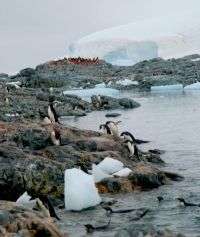Melting glaciers may release DDT and contaminate Antarctic environment

In an unexpected consequence of climate change, scientists are raising the possibility that glacial melting is releasing large amounts of the banned pesticide DDT, which is contaminating the environment in Antarctica. The study is scheduled for the June 1 issue of ACS’ bi-weekly journal Environmental Science & Technology.
In the study, Heidi N. Geisz and colleagues estimate that up to 2.0-8.8 pounds of DDT are released into coastal waters annually along the Western Antarctic Ice Sheet from glacial meltwater.
The researchers point out that DDT reaches Antarctica by long-range atmospheric transport in snow, and then gets concentrated in the food chain. DDT has been banned in the northern hemisphere and has been regulated worldwide since the 1970s. Geisz found, however, that DDT levels in the Adelie penguin have been unchanged since the 1970s, despite an 80 percent reduction in global use.
Global warming may explain that contradiction, they say. As the annual winter temperature on the Antarctic Peninsula has increased by about 10 degrees Fahrenheit in the last 30 years, glaciers have retreated. The possibility that glacial meltwater has contaminated Antarctic organisms with DDT, the study says, “has compelling consequences” if global warming should continue and intensify.
Source: ACS





















